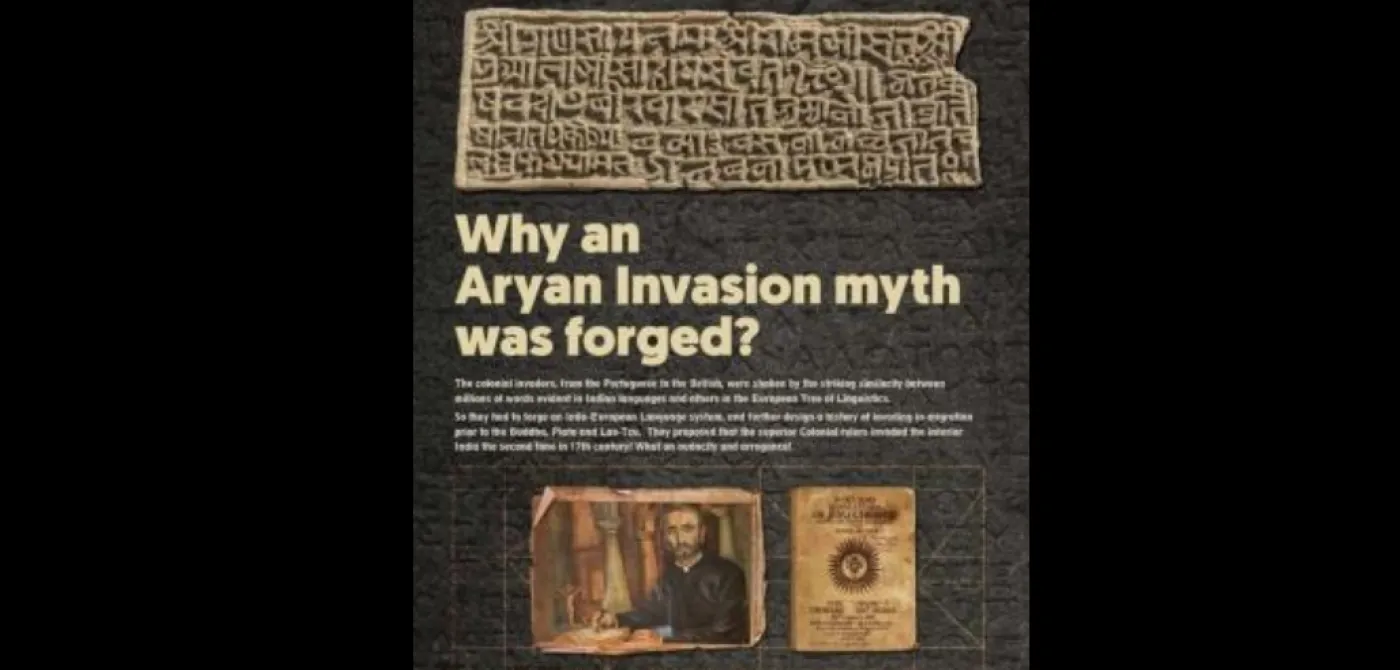S.K. Arun Murthi writes:
A calendar produced by the Indian Knowledge Systems centre at IIT Kharagpur has generated much controversy for its contradiction of the scientific and academic stance on historical issues. The calendar’s puerility lies in the stretched and irrelevant connections the commentaries make between concepts, obscure expressions, and mythologies. The calendar is such a shoddy preparation that this article rightly describes it as “an incoherent pastiche of imagery and symbols”.
Even in polemics and propaganda, there has to be some semblance of connectedness, however ill-conceived. Here, apart from being unscientific, irrational, and disdainful of current historical positions, the short commentaries provided on each page of the calendar are inane.
According to the calendar, “colonial historians” have distorted history and the distortion is further propagated by their followers — presumably, by all who do not agree with the content of the calendar. This “distortion,” according to the calendar, needs to be set right. Thus, the thematic heading of the calendar is “Recovery of the Foundations of Indian Knowledge Systems”.
The Indian epistemological tradition... [holds] that Vedas are an independent source of knowledge that cannot be contradicted. The commentaries in the calendar adhere to this circular epistemological tradition. This, in essence, is the secret of the Vedas that the commentary presents.
The use of the word ‘recovery’ implies that something is lost. Who is to be blamed for this loss? Presumably the invaders or the colonisers. (The unanswered question remains: how did outsiders invade us if we had such profound knowledge systems in ancient times, including Dhanur Vidya, knowledge of weaponry?) The other key word is ‘knowledge’. How, according to the Indian system, is knowledge characterised? According to the Sanskrit text Vedanta Paribhasa, a fundamental text on Indian epistemology, knowledge is that which is not already known and which cannot be contradicted- anadigatam abadhitam.
Such a definition says nothing about the idea of truth and justification of beliefs that are central to knowledge, ideas that have occupied space in Western philosophy. As a result, nothing much can be said, from the definition, about the nature of evidence, the method of evidence gathering, or how to make an argument to formulate a theory.
This becomes relevant in the context of what the commentary states is one of its objectives: "recognition of the secret of the Vedas.”
The word ‘secret’ is used as a metaphor in scriptures to convey the profundity of some thought. What is the secret of the Vedas? As far as Vedas are concerned, they are supposed to contain profound thoughts about the universe and the self.
In an essay on the Veda, the philosopher Debiprasad Chattopadhyaya, extensively quotes the renowned Bengali Sanskrit scholar Hara Prasad Sastri. According to Sastri, the Vedas have gained such authority that if someone needs proof for any claim she makes, she merely needs to say that it is declared so in the Vedas. Such a claim cannot be contradicted. This matches with the Indian epistemological tradition, where it is held that Vedas are an independent source of knowledge that cannot be contradicted. The commentaries in the calendar adhere to this circular epistemological tradition. This, in essence, is the secret of the Vedas that the commentary presents.
The calendar questions the currently accepted chronology. Among its faults, the authors say, is that the colonialists downgraded the “Altruistic and Cosmological foundations of the Vedas” and misinterpreted this foundation by “racial and genetic semantics.”
It is difficult to say what these expressions mean. They smack of the kind of pretension when one does not have something substantial to say and therefore conjoins high-sounding words to appear profound. According to the producers of the calendar, the presentation of genetic evidence in current theories is a semantic play to foster a wrong argument, oblivious of the fact that it is they who are indulging in wordplay.
Sentences with such expressions cannot be contradicted. They are similar to the sentence “colourless green ideas sleep furiously”, a phrase composed by Noam Chomsky. to illustrate its meaninglessness even though it is syntactically correct. Since it is neither true nor false, as it is meaningless, it cannot be contradicted. However, within the traditional Indian definition of knowledge, cited earlier, such meaningless sentences would amount to knowledge as they cannot be contradicted.
Such meaningless expressions are to be found generously spread throughout the calendar. The commentary states how the colonial historians forged a myth and that it was “an ‘error’ that had gone through the web of geo-political popularization.” One is again totally confused as to what to make out of this expression.
Under the heading “Cyclic Time and Reincarnation,” is a depiction of three Indus seals, bearing, respectively, a swastika, a cross, and a seal depicting a multiple headed animal. The commentary states that the swastika and the arrow of time of the “Arya Rishis” are depicted in the seals of the Indus Valley.. It is not at all clear which one of these seals depicts the arrow of time. Further, the swastika is a mystical mark denoting good luck and has nothing to do with either the idea of time or reincarnation. The same is the case with the seal of the multiple headed animals.
To make its case, the commentary irrelevantly invokes a phrase said to be part of the Rigveda’s seventh mandala: “yogakshema swastibhi.” However, I am not able to find this verse in the Rigveda.
Nevertheless, swastibhi is not be confused with Swastika; the meanings are different. The word yogakshema occurs in the Rigveda in the tenth mandala (10.166.5) but it does not have any bearing on spirituality. It means the secure possession of earnings and property, and also means welfare and prosperity; whereas Indian spirituality is more about liberation (mukti or moksha).
One is reminded of the old sales adage: 'If you cannot convince then try to confuse'. The calendar’s commentary does this effectively,
More empty expressions follow: subtle actions and reactions of the flow and value of work (karma-vada); transmigration and metempsychosis (janmantar-vada) of souls at the cosmic level; gnosis, and the ontology of ‘being and becoming’; and gnostic foundations of Indian spirituality. One cannot make much of these expressions and or their relationship with the depicted Indus valley seals.
The section ends with another howler: “the gnostic foundations of Indian spirituality is an element unknown to other civilisations. Therefore, the invading Aryans, if any, had nothing to offer to Indian Cosmology.” There is no connection between the premises and the conclusion, but the commentary presents them as if there is a connection by using the word ‘therefore’. And what has spirituality got to do with cosmology?
Such bloopers and howlers can be found across the calendar. One is reminded of the old sales adage: If you cannot convince then try to confuse. The calendar’s commentary does this effectively, through nebulous expressions and by making irrelevant connections to the seals of Indus Valley civilisation, to sell the idea of a glorious and indigenous past.
It is ironic that the “final nail in the coffin of Indian science and rationality” comes from a premier institute of science and technology. That is more the reason why, as rational citizens, we have to stand up against such pseudoscience and the attempt towards saffronisation.
(S.K. Arun Murthi taught philosophy in the Humanities and the Social Sciences Department of the Indian Institute of Science Education and Research, Mohali, Punjab.)









